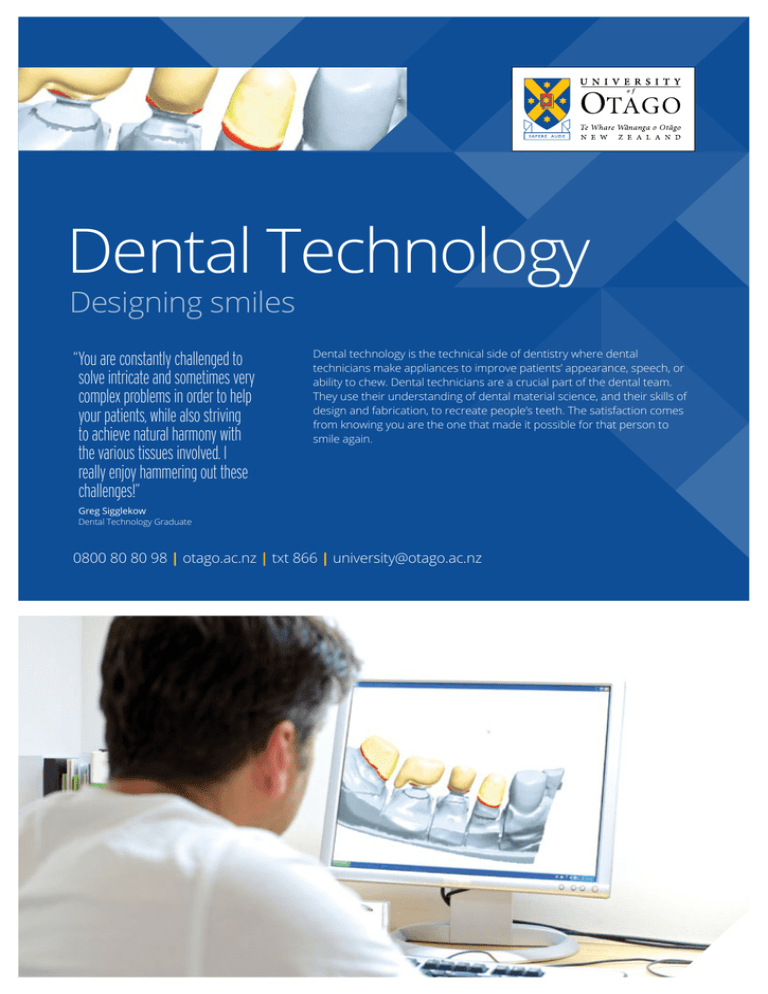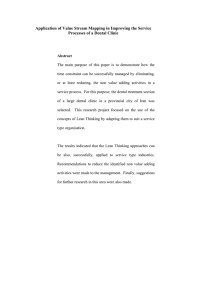Dental Technology - University of Otago
advertisement

Dental Technology Designing smiles “You are constantly challenged to solve intricate and sometimes very complex problems in order to help your patients, while also striving to achieve natural harmony with the various tissues involved. I really enjoy hammering out these challenges!” Dental technology is the technical side of dentistry where dental technicians make appliances to improve patients’ appearance, speech, or ability to chew. Dental technicians are a crucial part of the dental team. They use their understanding of dental material science, and their skills of design and fabrication, to recreate people’s teeth. The satisfaction comes from knowing you are the one that made it possible for that person to smile again. Greg Sigglekow Dental Technology Graduate 0800 80 80 98 | otago.ac.nz | txt 866 | university@otago.ac.nz What is Dental Technology? Dental Technology at Otago Professional registration Dental technicians work as part of the dental care team within a dental laboratory, and so don’t have direct contact with the patients. They design and construct artificial teeth (in various forms), removable orthodontic appliances, and maxillofacial appliances (such as artificial eyes, ears, and facial prostheses). The University of Otago’s Bachelor of Dental Technology programme is the only one in New Zealand. It is a three-year degree programme taught within Otago’s School of Dentistry. The profession of dental technician is registered under the Health Practitioners Competence Assurance Act (2004). Graduates of the Bachelor of Dental Technology programme are automatically entitled to register with the New Zealand Dental Council in order to practice as a Registered Dental Technician. Working with dentists, technicians use a wide range of materials including gold, porcelain, and acrylic, to design and construct appliances to meet each patient’s needs. The fact that the products they make can affect the health and appearance of a person, demands of the technician a high level of responsibility and accuracy. Dental technicians work with their hands on detailed and delicate items, and have good handeye coordination. A dental technician learns to visualise in a 3D perspective. They typically have an eye for detail to get things just right. Background required A minimum of 14 Level 3 NCEA credits in both Chemistry and Physics, or approved equivalent, are required for entry. Career opportunities Dental Technology is a global profession. Throughout the world there is a high demand for skilled dental technicians. The high skill base that New Zealand dental technicians achieve makes them desirable to overseas employers. In New Zealand and Australia, dental technicians are employed by commercial dental laboratories. These laboratories provide the bulk of the work for the private dental industry, the defence forces, hospitals, and state dental services. The ratio of employer to employee is approximately 1:3, and many dental technicians ultimately set up business for themselves. There are no barriers to becoming self-employed. This creates long-lasting relationships with other dental health professionals, and establishes the right dental care perspective from day one. During your study you will learn about the oral environment, biomaterial, design principles, and practical skills in designing and fabricating appliances for the mouth. These appliances include: • Artificial teeth (such as complete dentures) • Partial dentures • Implants • Mouth guards • Crowns • Bridges • Removable orthodontic appliances in materials such as acrylics, alloys, and ceramics Postgraduate study If you wish to take your knowledge beyond the Bachelor of Dental Technology, there is a range of postgraduate study options. There is a fourth-year honours programme for students that achieve high academic grades. There are further opportunities for higher study through the Postgraduate Diploma in Dental Technology, Master of Dental Technology, and PhD programmes. For those who are interested in treating patients there is a Postgraduate Diploma in Clinical Dental Technology. Graduates of this programme are able to offer a removable denture service direct to patients. The areas within the profession are diverse, with individuals specialising in different areas of dental technology. Profile Greg Sigglekow Greg Sigglekow didn’t enter the Bachelor of Dental Technology programme straight away. He started out studying physics in Christchurch, where he was surrounded by other students on a similar pathway. Greg realised he needed to “find something a bit different,” and that dental technology would be a good fit. “It incorporates the sciences that I enjoy, but with a more hands-on approach, almost in a craftsmanship sense,” he explains. “There is a considerable scope of practice. Maxillofacial reconstructions, orthodontics, prosthodontics, and material science research are really just the front door to each aspect within dental technology. Add to that, every single patient you treat requires an individualised treatment plan, requiring you to think logically and precisely. March 2015 “You are constantly challenged to solve intricate and sometimes very complex problems in order to help your patients, while also striving to achieve natural harmony with the various tissues involved. I really enjoy hammering out these challenges!” Greg’s now working as assistant manager and supervisor at a modern dental laboratory in Wellington. His position requires a dental technology qualification, as the main work he does is directly related to his training. Greg says the training he received at Otago was “incredibly inspiring.” “You’re surrounded by great minds from all corners of the world... teaching you methods, knowledge, and experience from medical, dental, and scientific backgrounds,” he says. Now that he’s entered the workforce, Greg has no regrets about his decision to switch from physics to dental technology. Reflecting on his career to date, he notes “the real pleasure is when, after you’ve put all you can into the processes and you get to see your patients genuinely smile again, that’s when you know you’ve changed someone’s life forever.” For questions about Dental Technology otago.ac.nz/dentaltechnology




